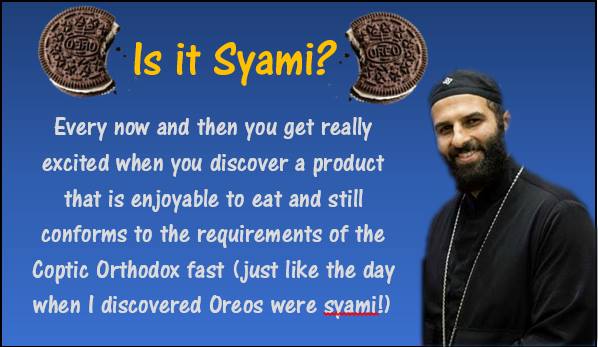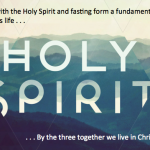"The true fast is that in which sins, anger, tongue, and instincts are under control" - St Basil the Great During these most holy days of Lent, one of the most common questions asked when deciding what to purchase from the supermarket is: "Is it syami (is it fasting)"? You quickly turn the item around …
“The true fast is that in which sins, anger, tongue, and instincts are under control”
– St Basil the Great
During these most holy days of Lent, one of the most common questions asked when deciding what to purchase from the supermarket is: “Is it syami (is it fasting)”? You quickly turn the item around and start to read the ingredients to ensure that the product does not contain any animal products. Every now and then you get really excited when you discover a product that is enjoyable to eat and still conforms to the requirements of the Coptic Orthodox fast (just like the day when I discovered Oreos were syami!).
The question: “Is it syami”? stems from the desire to offer to God an acceptable and honourable fast. As soon as milk solids is read out on the list of ingredients, the item is immediately returned to its rightful place on the shelf. After purchasing all our syami products, we proceed to the checkout with our conscience at ease that we are fulfilling our desire to offer God an acceptable and honourable fast. But are we really? Is this all that is required? Let us look at the how the Lord explained the acceptable fast to the prophet Isaiah:
“Would you call this a fast, and an acceptable day to the Lord? Is this not the fast that I have chosen: To loose the bonds of wickedness, To undo the heavy burdens, To let the oppressed go free, And that you break every yoke? Is it not to share your food with the hungry and to provide the poor wanderer with shelter” (Is 58:4-7).
Upon reading the lives of our saintly desert fathers, you will quickly notice two very common trends, they all lived their lives in the quest for spiritual perfection and they practiced extreme forms of physical asceticism. I believe these two simple observations, shed light on the perspective and purpose of fasting. One is the aim, and the other is the means. Although, this may seem to be obvious, we often lose perspective forgetting the aim (spiritual perfection) while aiming at the means (fasting).
St. John Chrysostom explains it as follows:
“Do you fast? Give me proof of it by your works. If you see a poor man, take pity on him. If you see a friend being honoured, do not envy him. Do not let only your mouth fast, but also the eye and the ear and the feet and the hands and all the members of our bodies.
Let the hands fast, by being free of greed.
Let the feet fast, by ceasing to run after sin.
Let the eyes fast, by disciplining them not to glare at that which is sinful.
Let the ear fast, by not listening to evil talk and gossip.
Let the mouth fast from foul words and unjust criticism.
For what good is it if we abstain from birds and fishes, but bite and devour our brothers”?
So if we would like to offer an acceptable fast to the Lord, let us not only offer the fasting of food, but moreover the fasting of the soul, as John Cassian teaches us saying: “We should not be confident that the outside fasting of food is enough alone for the purity of the heart and body, unless it is accompanied by the fasting of the soul”.
“Is it syami”? Let us not only ask ourselves this question before deciding what food to purchase, but let us ask this question before we refuse a brother a helping hand, let us ask this question before passing judgment on another, let us ask this question before gazing our eyes on a lustful scene, let us ask this question before losing our temper, let us ask this question before deciding not to pray at night and let us ask this question before every action and reaction we may take.
Join Us: Sign Up Today!
Tags:












